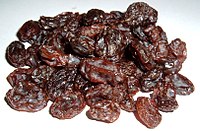| Revision as of 12:11, 14 July 2005 editRobotE (talk | contribs)15,723 editsm robot Adding: nn, nb← Previous edit | Revision as of 22:06, 14 July 2005 edit undoEpolk (talk | contribs)Autopatrolled, Extended confirmed users26,552 edits Raisins and tooth decay with referenceNext edit → | ||
| Line 8: | Line 8: | ||
| Raisins are also produced in ] especially in the areas of ], ] and smaller islands. The main variety used in the Greek raisin is the sultana. The grapes are mostly sun-dried thus producing seedless raisins of average size and golden color. A notable exception to this rule is the grape variety cultivated especially for the purpose of raisin production in ] that give darker and bigger type of raisin named Corinthian. Corinthian raisins are not seedless. | Raisins are also produced in ] especially in the areas of ], ] and smaller islands. The main variety used in the Greek raisin is the sultana. The grapes are mostly sun-dried thus producing seedless raisins of average size and golden color. A notable exception to this rule is the grape variety cultivated especially for the purpose of raisin production in ] that give darker and bigger type of raisin named Corinthian. Corinthian raisins are not seedless. | ||
| ==Raisins and tooth decay== | |||
| ]s and oral hygenists have long recommended against eating raisins as it was believed that the combination of sugars and stickiness in them would promote ] and ]. | |||
| Research indicates that the stickiness of a food is not an indicator of its effects on oral health. Raisins have been found to contain several chemical compounds that may assist in fighting oral ]. | |||
| In a laboratory, extracts from raisins were found to slow the growth of '']'', the main bacteria behind tooth decay. Five chemicals in raisins — ], ], ], ], and 5-(])-2-] — seem to be responsible for slowing the bacteria. In addition, oleanic acid prevents ''S. mutans'' from sticking to ]. (Wu, ''et al.'', 2005) | |||
| ==References== | |||
| * {{Conference reference | Author=C. D. Wu, J. F. Rivero-Cruz, M. Zhu, B. Su, A. D. Kinghorn | Title=Antimicrobial Phytochemcals in Thompson Seedless Raisins (''Vitis vinifera L.'') Inhibit Dental Plaque Bacteria | |||
| | Booktitle=American Society for Microbiology meeting. June 5-9. Atlanta | Year=2005 | Pages=}} | |||
| ==External links== | ==External links== | ||
| * |
* {{Web reference date format | title=Raisins | work=Cooking.com | URL=http://www.cooking.com/advice/adgloss.asp?GlossType=ingr&Item=Raisins | date=2005-07-14}} | ||
| ] | ] | ||
Revision as of 22:06, 14 July 2005
For other uses, see Raisin (disambiguation).
Raisins are dried grapes. Raisins can be eaten raw or used in cooking and baking. Raisins are very sweet due to the high concentration of their sugars, and if they are stored for a long period the sugar crystallises inside the fruit. This makes the fruit gritty, but does not affect the usability. To decrystalise raisins, they can be soaked in liquid (alcohol, fruit juice or boiling water) for a short period, dissolving the sugar.
In the United States, the term 'raisin' refers to any form of dried grape. California raisins – both the sun-dried dark naturals and the goldens – are made by drying Thompson seedless grapes; goldens are flame dried. Another variety of seedless grape, the Black Corinth, is also sun dried to produce Zante currants, mini raisins that are much darker in colour and have a tart, tangy flavour. In Australia and other countries specific varieties are given separate names. In particular, in Australia raisins are largest, sultanas are intermediate, while currants are smallest.
Raisins are also produced in Greece especially in the areas of Peloponessus, Crete and smaller islands. The main variety used in the Greek raisin is the sultana. The grapes are mostly sun-dried thus producing seedless raisins of average size and golden color. A notable exception to this rule is the grape variety cultivated especially for the purpose of raisin production in Corinth that give darker and bigger type of raisin named Corinthian. Corinthian raisins are not seedless.
Raisins and tooth decay
Dentists and oral hygenists have long recommended against eating raisins as it was believed that the combination of sugars and stickiness in them would promote tooth decay and gum disease.
Research indicates that the stickiness of a food is not an indicator of its effects on oral health. Raisins have been found to contain several chemical compounds that may assist in fighting oral bacteria.
In a laboratory, extracts from raisins were found to slow the growth of Streptococcus mutans, the main bacteria behind tooth decay. Five chemicals in raisins — oleanolic acid, oleanolic aldehyde, betulin, betulinic acid, and 5-(hydroxymethyl)-2-furfural — seem to be responsible for slowing the bacteria. In addition, oleanic acid prevents S. mutans from sticking to tooth enamel. (Wu, et al., 2005)
References
-
{{cite conference}}: Empty citation (help) Abstract